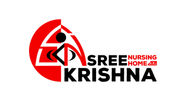❄️ Frozen Shoulder: Symptoms, Causes & Fast Relief at SKNH
- The SKNH

- Jun 29
- 3 min read

🩺 What is Frozen Shoulder?
Frozen shoulder, also known as adhesive capsulitis, is a painful condition where the shoulder joint becomes stiff and inflamed, limiting movement. It can develop slowly and last for months or even years without proper treatment.
At Sree Krishna Nursing Home (SKNH), we specialize in early diagnosis and fast non-surgical treatment to restore mobility and reduce pain.
📉 Why Does It Happen?
The shoulder joint is surrounded by a capsule of connective tissue. In frozen shoulder, this capsule becomes thickened and tight, restricting movement.
🔍 Symptoms of Frozen Shoulder
Frozen shoulder develops in three stages:
Stage | Description | Duration |
Freezing Stage | Increasing pain and stiffness, range of motion decreases | 6 weeks to 9 months |
Frozen Stage | Pain may ease, but stiffness worsens | 4 to 6 months |
Thawing Stage | Gradual improvement in mobility | 6 months to 2 years |
Common Symptoms:
Dull or aching pain in the shoulder
Inability to lift the arm above the head
Pain during sleep, especially when lying on the shoulder
Difficulty with everyday tasks (combing hair, reaching overhead)
👩⚕️ Who Is at Risk?
Risk Factor | Why it Matters |
Diabetes | Most common associated condition |
Age (40–60 years) | Middle-aged adults are more prone |
Women | More commonly affected than men |
Shoulder Injury or Surgery | Can lead to reduced use and stiffness |
Thyroid Disorders | Affects connective tissue metabolism |
Immobility (post-fracture/stroke) | Lack of movement causes capsule tightening |
🧪 Diagnosis at SKNH
SKNH doctors perform clinical evaluations and imaging tests for accurate diagnosis.
Diagnostic Tools:
Physical Exam – Range of motion and pain response
X-ray – Rule out arthritis or bone issues
Ultrasound or MRI – Check for inflammation, fluid buildup or capsule thickening
🛠️ Non-Surgical Treatments at SKNH
Most patients recover without surgery through early intervention and proper care:
✅ Physiotherapy
Stretching & mobility exercises
Shoulder pendulum movement
Muscle-strengthening therapy
Heat and cold packs
✅ Medications
Anti-inflammatory drugs (NSAIDs)
Corticosteroid tablets for severe pain
Muscle relaxants if needed
✅ Injections
Corticosteroid injections into the joint capsule
Reduce inflammation and accelerate mobility recovery
✅ Other Support
Transcutaneous Electrical Nerve Stimulation (TENS)
Ultrasound therapy
Ergonomic advice for daily use of the arm
❌ When is Surgery Needed?
Surgery is rarely required. In severe cases, Arthroscopic Capsular Release may be performed to loosen the joint.
At SKNH, we aim to avoid surgery through effective rehabilitation and shoulder therapy.
🧘 Prevention Tips from SKNH
Do not ignore shoulder pain – early action prevents stiffness
Do regular shoulder stretches if you’re sedentary
Manage blood sugar if diabetic
Avoid slings or arm rests for long durations post-injury
Seek medical advice if movement is painful
📌 SKNH Shoulder Clinic – Services Offered
Service | Available at SKNH |
Orthopedic & Rheumatology Consultation | ✔️ |
Physiotherapy & Rehab Centre | ✔️ |
Ultrasound & Digital X-Ray | ✔️ |
Shoulder Injection Treatments | ✔️ |
Pain Management Counseling | ✔️ |
Home Exercise Plan Guidance | ✔️ |
💬 A Word from SKNH Shoulder Experts
“Frozen shoulder is treatable without surgery in most cases. The sooner you act, the faster your shoulder recovers. At SKNH, we’re committed to helping you move pain-free again.”— Dr. K.P. Maity, Orthopedic Consultant, SKNH
📞 Contact SKNH – Shoulder Pain Relief Starts Here
Sree Krishna Nursing Home (SKNH)
📍 Narayangarh, Paschim Medinipur, West Bengal – 721437
📞 03229-258257 / +91 8327529897
✅ Shoulder Pain? Let’s Fix That – Visit SKNH Today
Early diagnosis & expert therapy = Faster recovery without surgery.















Comments